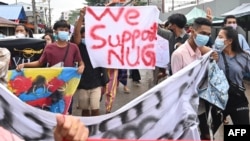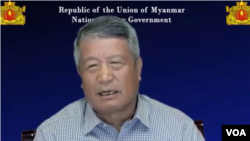Myanmar’s opposition National Unity Government recently raised the argument that it has been mischaracterized by the international news media.
Kyaw Zaw, a spokesperson for the NUG president’s office told VOA Wednesday in a statement the NUG is not an exiled government because most senior leaders, including the acting president, as well as the prime minister and many cabinet members, still live and work in Myanmar.
International news organizations, including The Washington Post, The New York Times, BBC and Al Jazeera have referred to the NUG as “the exiled government,” “the shadow government,” and a “parallel government in exile.”
An advocacy group, the Special Advisory Council for Myanmar, has also amplified the NUG’s position that it is not in exile. The group’s cofounder, Chris Sidoti, said in a video posted on Twitter in early February, “I want to emphasize that NUG is not in exile. Most of the NUG is in Myanmar. It's not underground and it's not in the shadows.”
Referring to the National League for Democracy party, which led the government overthrown two years ago in a coup, he added, “We deal frequently at length online with the NLD leadership collectively, and individually all the time.
“This is an active government who is prepared to welcome our advice and make their own decisions; and we see the NUG already acting like a government in the areas that it controls and the areas working collaboratively with ethnic organizations in the areas that they control.”
However, David Mathieson, a Southeast Asia analyst, said in an email to VOA Tuesday that “it is ridiculous to claim that the NUG is not in exile. Obviously, because of security reasons, [NUG ministers] can’t all be in some assembly of parallel governance somewhere inside the country.”
“But,“ Mathieson continued,“to dispute that the minister of federal affairs is in Sweden ... and others are in Italy, the U.S. and regional states is just being disingenuous.”
“Many people inside Myanmar, and outside, resent the NUG’s claims of being a supreme political body in opposition to the Myanmar military ... especially when the NUG makes mistakes or claims successes that are not its own,” he added.
Mathieson said the term “shadow government” is often used to portray an opposition government that is currently not holding power and awaiting general elections. He suggested that instead of being “precious about the terminology,” the international media and human rights groups should be careful to “correctly characterize political entities.”
Myanmar Now Editor-in-Chief Swe Win also shared his views on characterizing the NUG.
“There is no doubt that the National Unity Government is the legitimate government of Myanmar, but we have found it sometimes tricky to fully describe its current status given its ongoing struggle to topple the military regime from power, with many of its leaders making decisions either from jungle hideouts or from overseas locations,” he said.
“In this context, it is sometimes tempting for us to label NUG either as shadow or exiled government,” Swe Win said.
Myanmar Now had to move operations out of Myanmar because of a crackdown on media outlets by the military junta shortly after the February 2021 coup. The news agency currently publishes bilingual Burmese and English articles on its online portal.
Some Myanmar news agencies, such as the VOA Burmese-affiliated Mizzima, refer to the NUG as the “Myanmar parallel government in exile,” but the online publication, Irrawaddy, describes the NUG as the “civilian government.”
After a 1988 military coup, parliamentarians who won the 1990 election came out of safe areas at the border controlled by ethnic armed groups and formed the exiled coalition government, known as the NCGUB, or National Coalition Government of the Union of Burma. That entity, like the NUG, was formed by elected members of parliament and ethnic minority leaders. The international news media at that time often called the NCGUB a “coalition government in exile” or “the exiled government.”
“However,” Kyaw Zaw said, “the NCGUB was established inside Myanmar, and it later moved to operate outside of the country.”
The NUG, he said, “was formed inside Myanmar by the parliament, and it continues operating from inside Myanmar, including the Head of State, Acting President Duwa Lashi La; and the Head of Government, Union Prime Minister Mahn Win Khaing Than. In addition, NCGUB was only a De Facto government, while the NUG has is a De Jure Government.”
Myanmar Now’s editor-in-chief Swe Win told VOA that he and his colleagues have avoided labeling the NUG as a shadow or exiled government since “this may call into question its legitimacy.”
“Therefore,” he said, “we are describing it as a publicly mandated government instead.”





